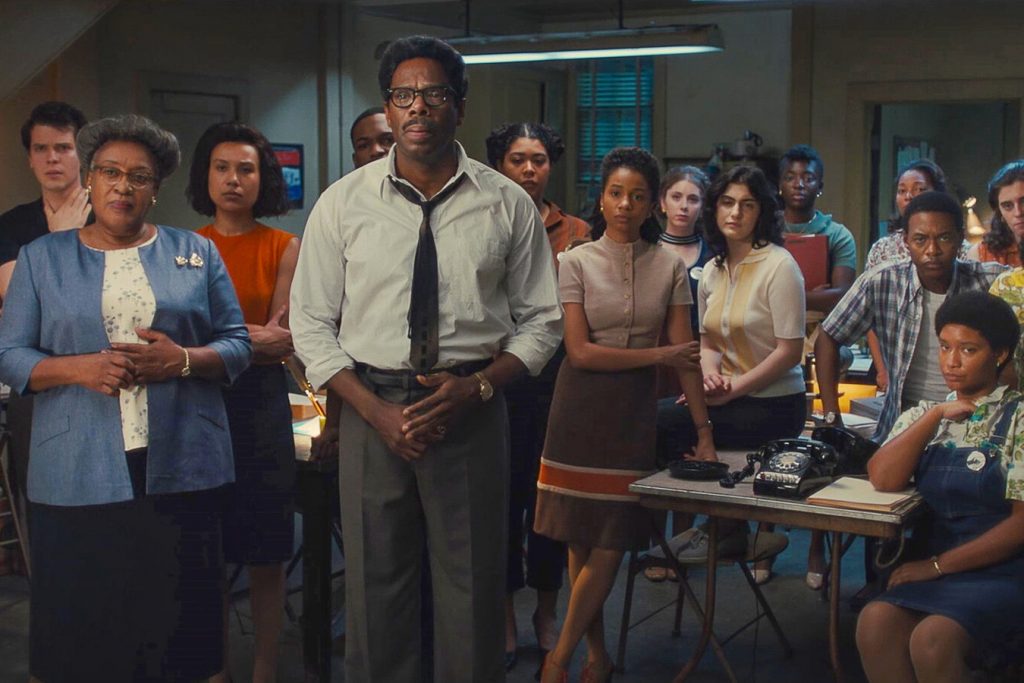Remembering Rustin
Remembering Rustin
Review: The Netflix film shares the overdue story of a Black, queer civil rights leader whose little light never got its full chance to shine, until now.

“This little light of mine / I’m going to let it shine.”
These are the lyrics that open the film, finally spreading the news about Bayard Rustin. The gospel song, a staple in pivotal moments of Black history, selected by music director Branford Marsalis to open a film on the long overdue story of a civil rights leader whose little light never got its full chance to shine — until now — was spot on.
The film thrusts the audience back into a time leading up to the 1963 March on Washington. The movie emphasizes that the historic event, integral to the Civil Rights Movement, would not have occurred without the tenacity of the film’s main subject.
Rustin, a Black openly gay man, faced conflicts between intersecting aspects of his identity, as depicted in the Netflix biopic. The film explores the strained relationship between Rustin and his dear friend, Dr. Martin Luther King, Jr., played with groundedness and sincerity, by Aml Ameen. Their relationship was affected by homophobic rumors and Rustin being labeled a “convicted homosexual.”
As the film and history shows, the two would later make amends and change the trajectory of civil rights in America. The film was produced by former President Barack Obama and former First Lady, Michelle Obama, who posthumously awarded Rustin the Presidential Medal of Freedom in 2013.
Veteran actor Colman Domingo masterfully embodies the titular leading role, portraying Rustin with conviction, commanding every scene to showcase intersections not often depicted on screen. For folks who had no idea who the heavy smoking, clap-backing, persevering, passionate civil rights heavyweight was, they certainly do now.
“On the day I was born Black, I was also born homosexual. They either believe in freedom and justice for all or they do not,” Rustin exclaimed in the film, fighting to affirm his sexuality to his Black colleagues. Rustin’s message still echoes conversations of Black liberation related to the intersection of race and sexuality today.
Rustin doesn’t stop there. The film continues to unravel internalized homophobia and shame as he confronts his lover, Elias Taylor—portrayed by Johnny Ramey, one of the few non-biographical characters in the film—urging him not to end their secret affair.
“How can you speak of love when your heart disconnects from your flesh?” Rustin said, addressing the internal conflict queer folk experience when trying to live their truth with the weight of with heteronormative pressures.
“The only thing you’re committed to is your safety and superiority,” Rustin continues, scrutinizing his white colleagues, facing the reality of white supremacy and inequality head on. “I can’t surrender my differences; the world won’t let me.”
Tony-Award winning George C. Wolfe helms as director of the film with co-writer Justin Breece, making the rarity of two (three including Domingo) Black, queer men spearheading a major film release a reality.
The film is notably co-written by Dustin Lance Black, the Academy Award Winner for Best Original Screenplay for the 2008 film Milk, which highlights the gay rights leader, Harvey Milk. Black’s contributions to the script are apparent, down to the titles, both in homage to the trailblazer’s last names.
While Domingo shines, the supporting cast is star-studded with Chris Rock, Glynn Turman, CCH Pounder, and Da’Vine Joy Randolph with theatre veterans, Audra McDonald, Jeffrey Wright, Michael Potts, and Adrienne Warren.
The penultimate scene includes the triumphant moment of the march gathering on the Lincoln Memorial lawn and King reciting those now legendary and famous final words of his “I Have A Dream” speech.
“Free at last. Free at last. Thank God almighty, we are free at last.”
As applause swells from the crowd, King looks back at Rustin, who has been standing by his side, and extends a satisfactory smile. The scene reveals a perspective from that historic day, sharing a narrative previously absent from the pages of history books.
The film’s final scene shows Rustin declining to join the Big Ten (MLK, John Lewis, Walter Reuther, et. al) in the meeting with the president to discuss race relations. Instead, with the utmost humility, the film honors his commitment to pick up trash on the lawn with fellow volunteers and organizers. A testament to a man who’s always been about the work.
The film ends there, with Rustin collecting trash to a rendition of the civil rights song, “We Shall Overcome.” The closing music represents the hope and victory felt that day, as well as a particular praise and promise for the future.
While we can debate how far we’ve actually come in since the 1963 March on Washington, the film suggests we can, at the very least, rejoice in the long overdue recognition and remembrance of its Black queer ring leader – Bayard Rustin.
